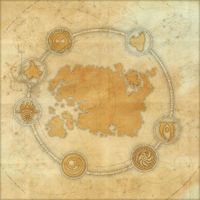- "Anu encompassed, and encompasses, all things. So that he might know himself he created Anuiel, his soul and the soul of all things." —The Monomyth
In the Altmer tradition, Anuiel (or Anui-El) is the soul of Anu the Everything and of all things.[1][2][3] He is seen as Order, the Everlasting Ineffable Light, and is dichotomically opposed to Sithis, who represents Chaos, the Corrupting Inexpressible Action.[2] And though Anuiel is often described with such terms, Sithis worshippers regard him as a demon as he represents the stasis of Anu, which in their eyes is unchanging nothingness.[4] The interaction of these two opposing forces is the Gray Maybe, Nirn (though the entirety of the Aurbis is also used in this context), and from this interaction spring the et'Ada, or Original Spirits.[2]
Anuiel is said to be responsible for the time-law established within Nirn.[5] Similarly, it is also said that the soul of Anuiel is Auri-El, who infused the Aurbis with time.[1][2]
MythologyEdit
Altmer-The Heart of the WorldEdit
"The Heart of the World" is the Altmeri creation myth presented in The Monomyth.
The Altmer believe that existence began with Anu the Everything, who encompassed and encompasses all things. Seeking to know himself Anu created his soul, Anui-El, who, also given to self-reflection, went on to create Sithis as the sum of all limitation via which he'd differentiate between his myriad attributes and ponder himself. An interplay which is the Aurbis.[2]
The primordial Aurbis was a place of chaos, as Anui-El ruminated without design. Seeking an escape, the Aspects of Aurbis asked Anu for a schedule they could follow to exist outside perfect knowledge. In response Anu created Auri-El, the soul of Anui-El, who spread through Aurbis as the force called Time, allowing the Aurbic aspects to understand themselves and take names.[2]
One of the aspects was Lorkhan, more of a limit than a nature, he wandered Aurbis planting new ideas based on restriction and outlined a plan to create a new world where even the aspects of aspects would be allowed to self-reflect, the Mundus. Many chose to follow, and even Auri-El was swayed by the promise of becoming king of this new world.[2] But Lorkhan had tricked the other spirits, as Mundus was a place composed almost wholly of limitation. Many of the et'Ada vanished completely, most of those left followed the flight of Magnus, becoming the Magna-Ge, but some of those present chose instead to stay after he departed keep working in the new world in order to keep it viable.[6][1] Among those Et'Ada who stayed, some would follow the example of Y'ffre, giving themselves to the Mundus fully to stabilize it and form the foundation of its natural law, and would typically be referred to from that point on as "Earthbones" or "Earth Bones". Others would choose not to give themselves fully but to populate Nirn instead, having to "make children just to last", these spirits would from that point typically be referred to as the "Ehlnofey".[UOL 1] The offspring of the Aedra would exhibit a gradual change however, each consecutive generation was weaker than the one prior, more removed from their progenitors in stature and might.[7][2]
Through this generational phenomenon of diminishment the offspring of the Ehlnofey would would eventually give away and the first Aldmer would arise, while the "weakest souls" that resulted from it would be formed by Lorkhan into armies he named "Men".[1][2]
This participation, an event the Altmer would name the Sundering,[8] would be considered Auri-El's only known moment of weakness, an act which forever sundered the elves from the spirit worlds of eternity.[1] Auri-El and the other gods of the Aldmer were disgusted by their enfeebled selves and what they had created, and insisted that everything was permanently spoiled, and all they would be able to do would be to teach the elves to suffer with dignity.[2]
To make up for his error, Auri-El led the original Aldmer against the armies of Lorkhan in mythic times, vanquishing him and establishing the first kingdoms of the Aldmer, Atmora and Old Ehlnofey.[1][2] During this conflict Auri-El begged Anu to take them back but Anu refused as he'd already created something to replace them. The more merciful Anui-El created Auriel's Bow and Auriel's Shield to be used by Auri-El against Lorkhan's hordes. Though Atmora was retaken by men and Old Ehlnofey was sundered, Auri-El's greatest knight, Trinimac (who, in some places, was even more popular than Auri-El[1][9]), succeeded in defeating Lorkhan, and Auri-El hid his Heart by attaching it to an arrow and sending it far into the sea.[2]. After Convention was held by the victors and the laws which would govern the mortal world were decided on,[10], the Aedra departed the world as their direct presence destabilized reality and time.[UOL 2] Auri-El ascended to heaven in full observance of his followers so that they might learn the steps needed to escape the mortal plane.[1][2]With this event the gods and magic in the mythic sense exited the world and history, finally linear, began.[2][6]
DunmerEdit
The Dunmer believe that the birth of Sithis was the start of creation, as the everlasting stasis of Anu meant nothing could ever change. Sithis broke the nothing and creating ideas that ebbed and flowed out of it. Anuiel, the demon, came later and created the Aedra in order to counter him by building 'everlasting, imperfect worlds'. To counter this, Sithis begat Lorkhan, who created the mortal world and allowed things to once again decay by trapping the other gods within.[4] The Dark Brotherhood, having split off from the Dunmeri organization known as the Morag Tong, seems to share this belief, as this story can be found in many of their hideaways.
According to Vivec, Stasis and Change, Anu and Padomay, are infinite forces and realms residing in the infinite Void, the latter infinity paradoxically enclosing the others in a manner akin to an encircling sphere. At the intersection of the two forces, where they touch, lies a "perfect circle of pattern and possibility", the Wheel, and inside that Wheel lies the Aurbis which is its foundation. Vivec claims that outside the Wheel exists the Void, which cannot truly be named and is bereft of anything. The Void is said to have more aspects than just Stasis and Change, but they cannot be named as they are outside of true language. Vivec claims Anu and Padomay "awakened" during the process of sub-creation caused by their intersection as "to see your antithesis is to finally awaken". It is said that in reaction to this "each gave birth to their souls", Auri-El and Sithis. Each of these souls regarded the Aurbis in their own part, and from that came the et'Ada, the "original patterns.[UOL 3]
OtherEdit
Some sources claim that, rather than being a single wheel, the Aurbis, the intersection of Anu and Padomay, is instead more akin to "a telescope that stretches all the way back to the eye of Anui-El, with Padomaics innumerable along its infinite walls".[UOL 1]
NotesEdit
- The Aka-Tusk is a particularly "old and needed" version of the Time Dragon from the days of the Ehlnofey, and Alduin was shed from him by "Heaven itself".[UOL 4][UOL 5]
- The daughters and sons of Anuiel introduced Y'ffre's name to Druids of Galen.[11]
- Personifying Anuiel is considered by certain Imperial scholars to be a cardinal error, as they are the essence of order, a cosmic principle that pervades the Aurbis and the orderly esence of all the Aedra. Altmeri temples are dedicated to Anuiel through this correlation.[12] Although the Altmer aim to 'advocate the will of Anuiel',[UOL 6][12] it is often considered a flowery language term for "making up new rules for others to follow".[12]
- The name of Anuiel is present in various Altmeri exclamations, such as "By Anuiel's grace",[13] "Anuiel's clarity",[14] and "Anuiel's fury".[15]
- According to Bosmer Spinners day, night, and the places between are the manifestation of Y'ffre's interpretation of the time-law Anui-El is said to have established within Nirn.[16]
See AlsoEdit
ReferencesEdit
- ^ a b c d e f g h Varieties of Faith... — Brother Mikhael Karkuxor of the Imperial College
- ^ a b c d e f g h i j k l m n The Monomyth
- ^ The Alduin/Akatosh Dichotomy — Alexandre Simon, High Priest of the Akatosh Chantry, Wayrest
- ^ a b Sithis
- ^ Girnalin's dialogue in ESO
- ^ a b Before the Ages of Man — Aicantar of Shimerene
- ^ The Mystery of Artaeum — Penewen, Advisor to the Court
- ^ Folly of Man
- ^ The True Nature of Orcs
- ^ Aurbic Enigma 4: The Elden Tree — Beredalmo the Signifier
- ^ Wyrd and Druid — Archdruid Barnabe's Discourse with Mainlanders, 2E 553
- ^ a b c Phrastus of Elinhir Answers Your Questions — Phrastus of Elinhir
- ^ Seaman Ambaran's dialogue in ESO
- ^ Valrendil's dialogue in ESO
- ^ Ambient Dialogue in reaction to assault in ESO
- ^ Girnalin's dialogue in ESO
Note: The following references are considered to be unofficial sources. They are included to round off this article and may not be authoritative or conclusive.
- ^ a b Michael Kirkbride's Posts
- ^ Nu-Mantia Intercept — Nu-Hatta, The Imperial Library
- ^ The Thief Goes to Cyrodiil — Vivec
- ^ Michael Kirkbride AMA
- ^ The Seven Fights of The Aldudagga
- ^ Nu-Mantia Intercept, Letter Seven
|
|||||||||||||||||
|
|||||||||||
|
||||||||||||||||||||||||||

